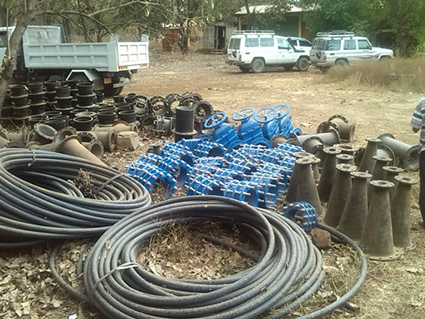13.1 Procurement in the OWNP
Procurement can be simply defined as buying or obtaining goods and services. You could say that shopping for everyday goods is a type of procurement. In programme management, however, procurement is a more complex process that needs to be undertaken carefully to ensure money is well spent. All implementing units of the OWNP need to adopt appropriate procurement processes in order to obtain the necessary goods and services they need, from buying hardware such as pumps, tanks and IT equipment to contracting services with consultants and artisans (Figure 13.1).

For anything other than simple purchases of inexpensive items, there are several necessary steps in any procurement process:
- Planning and preparation: e.g. identifying a need for something, considering when you need it and ensuring that you have the finance available, etc.
- Specification: written details of the item(s) to be purchased or service(s) required.
- Identifying and selecting suppliers: finding out who can supply the goods/service(s) and at what price. In some situations, formal procurement processes are applied that require quotes from a minimum number of suppliers so that a sensible comparison can be made between them and that the best choice is made in terms of value for money and quality.
- Decision: decide which supplier to choose, considering all relevant factors including quality and reliability as well as price; place the order.
- Delivery: Receive the goods or, for procurement of services, manage the ongoing contract until the work is completed.
For a lot of WASH projects, there are many different types of goods and services required that all need to be available at the right time and in the right order. It can be costly and inconvenient if a project is delayed because an essential component is late being delivered. This means the steps in the procurement process with different suppliers have to be coordinated and aligned with the required schedule, which adds to the challenge.
Some examples of the types of procurement required by the Programme are shown in Table 13.1.
| Category | Provided by | Examples |
|---|---|---|
| Services | Service providers, including artisans, at woreda level |
|
| Consultants (firms or individuals) at regional and national level |
| |
| Works | Contractors |
|
| Goods | Woreda-level suppliers including artisans |
|
| Regionally based suppliers |
|
Procurement is therefore a complex process requiring the people responsible to have a range of skills and knowledge. In the OWNP, procurement and contract management have been identified as major constraints in implementing WASH activities because of past inefficiencies. To try to overcome this problem, the Programme will use standardised systems and procedures to ensure good practice is followed. For procurement of services, works, and goods, the ministries, regional bureaus and woreda offices use standard bidding and contract documents which comply with government rules and regulations. Guidelines and manuals for procurement have been prepared to support the process and to advise on correct and efficient procedures. As an illustration, if you were the person responsible for procurement, one option you might consider is packaging a group of services into one contract to make savings and improve efficiency. For example, the design and supervision of four or five water supply schemes or construction of latrines for several schools or health facilities could be packaged as one contract which could be less costly and more efficient than several separate contracts (OWNP, 2013).
For major contracts, competitive bidding procedures are used. Competitive bidding is where several service providers compete with each other to bid for the work. A specification for the required work is advertised and service providers submit proposals that describe how they propose to do the work, the timescale and how much it will cost. These bids are compared and evaluated, and the contract awarded to the winner of the competition, i.e. the provider with the best proposal. For the OWNP, there are specified procedures to be followed for very large, high-cost projects. Depending on the overall value of the contract, they require either national or international competitive bidding.
At the other end of the scale, at local level, woredas, towns and communities also have responsibility for procurement. Based on the government policies of decentralisation and devolving responsibility, WASH procurement should be carried out as far as possible at the level where goods are utilised and services are delivered. Employing people who are skilled in procurement processes at the local level will:
- minimise delays in delivering goods or services and the resulting costs
- increase the sense of ownership and management capability among communities
- encourage entrepreneurship and strengthen the supply of spare parts
- further advance and modernise the sustainability of operations and maintenance.
To this end, the community-managed project (CMP) approach is actively promoted. In this modality, the procurement of materials required for water point construction is carried out by the WASHCOs themselves or by artisans contracted by the WASHCO. Similar principles also support the self-supply approach, where households directly provide or procure the labour and materials for the construction or maintenance of their hand-dug wells and sanitation facilities.
Keeping records of procurement processes and reporting on expenditure is part of the financial management system you read about in Study Session 12. This is also part of the essential monitoring of overall progress towards achieving the aims of the programme, which is the main focus of this study session.
Learning Outcomes for Study Session 13
